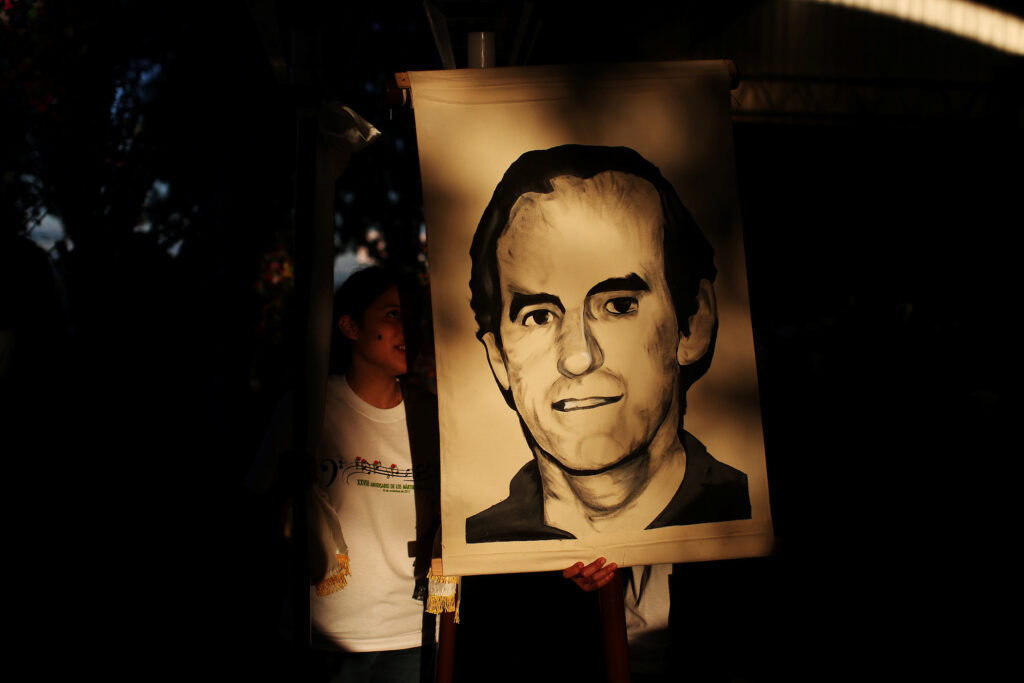EL SALVADOR: Ex-President Charged for Massacre of Jesuits
by Jeff Abbott, Journalist

Students hold a portrait of Jesuit Father Ignacio Ellacuria Nov. 11, 2017, at Central American University in San Salvador, El Salvador, prior to a procession commemorating the 28th anniversary of the murder of six Jesuit priests and two employees killed in 1989 during the Salvadoran civil war. (CNS photo/Jose Cabezas, Reuters)
Alfredo Cristiani, the former president of El Salvador, has been charged by prosecutors for his role in the 1989 massacre of six Jesuit priests at the height of the country’s internal armed conflict. He is accused along with twelve others, primarily high-ranking members of the military.
“[The case] has been a symbol of impunity in El Salvador and in the public prosecutor’s office for more than twenty years, which has always been on the side of the perpetrators, never on the side of justice,” Leonor Artega, the executive director of the Washington, D.C.-based Due Process of Law Foundation, tells The Progressive. But there are questions about the accusations against the former president.
“It is a right of the victims to have a judicial process, where the truth comes out, against the intellectual author.” Artega says. “Behind these orders for arrest there is no solid investigation, there is no evidence from an investigation by the prosecutor’s office.” She adds, “There is not enough evidence to consider him as a defendant in the case. The Truth Commission mentioned Cristiani in its report, but to prosecute him criminally, other types of evidence are needed that apparently do not exist.”
Artega suggests that this could be yet another action by El Salvador’s current President Nayib Bukele to attack his political rivals, specifically among the political and economic elite. The lack of evidence, she feels, will likely lead to the case failing in the courts.
Cristiani, a member of the far-right ARENA party and part of the political elite, oversaw the signing of peace accords with leftist guerrillas of the Farabundo Martí National Liberation Front (FMLN) in 1991. The peace accords brought the country’s twelve-year brutal civil war to an end. Cristiani, who served between 1989 and 1994, has denied any knowledge or involvement in the plans to carry out the massacre of the Jesuit priests.
This is the first time that a former president is being accused of crimes against humanity during the country’s internal armed conflict. While there are questions about the case, its advancement in El Salvador is welcomed by the victims’ lawyers. “It is a victory….” Arnau Baulenas, a lawyer who represents the families of the victims of the massacre, tells The Progressive. “It is a right of the victims to have a judicial process, where the truth comes out, against the intellectual authors.”
On November 16, 1989, soldiers from the infamous Atlacatl battalion invaded the campus of the Jesuit-run University of Central America in San Salvador. The soldiers had been given orders to leave no witnesses. The Atlacatl battalion was an elite unit trained at the US Army School of the Americas and at Ft. Bragg, for rapid response and counterinsurgency in the early 1980s. The UN-sponsored truth commission found that the unit was responsible for a number of high profile massacres, including the killing of the Jesuit priests, during the country’s twelve-year civil war, which left more than 75,000 people dead, and 8,000 disappeared. Father Ignacio Ellacuría, the university’s rector, along with five other Jesuit priests, a housekeeper, and her teenage daughter were brutally murdered by the soldiers. Father Ellacuría had been an instrumental part of the negotiations for peace between the Guerrillas and the Salvadoran government. At the time, there were attempts by the ultraright and segments of the Salvadoran military to smear Father Ellacuría as a communist sympathizer and “a tool” of the guerrillas.
The crime had remained unprosecuted for decades, in part due to a post-war amnesty law that protected those accused of carrying out crimes during the civil war. This amnesty law was ruled unconstitutional in 2016 by the country’s Supreme Court. A Spanish court in 2020 sentenced former Salvadoran Colonel Inocente Orlando Montano, who had been vice minister of defense and public safety for the Salvadoran government at the time of the murders, to 133 years for his part in the massacre of the priests. He was one of eight people accused in Spain, the home country of five of the murdered Jesuits.
El Salvador marked the thirtieth anniversary of the signing of the peace accords this January. But the country failed to hold a public ceremony to commemorate this anniversary, in part due to the position of President Bukele, who referred to the peace accords as a “farce.” “President Bukele has no real interest in justice…his actions have shown that he is a president who believes more in the power of imposition and control, who does not comply with the laws,” Artega explains. Bukele, elected in 2019, has largely sought to erase these accords and diminish what occurred during the internal armed conflict in the 1980s and early 1990s, while at the same time growing closer to the country’s military forces.
Bukele has taken significant steps back from the accords, including increasing the presence of the Salvadoran military in the country’s public security structure, and deploying soldiers against the country’s congress in 2020.
The military has also blocked investigators from access to the archives of the El Mozote massacre, which is also currently in the courts. There are seventeen former high-ranking military officers who are facing charges for massacring 800 civilians in the village of El Mozote in 1981. This massacre was also carried out by the US-trained Atlacatl battalion.
“We want these cases to advance in El Salvador,” Artega says. “The impunity of the past continues to send a negative message.”
Source: The Progressive, 3/14/22
